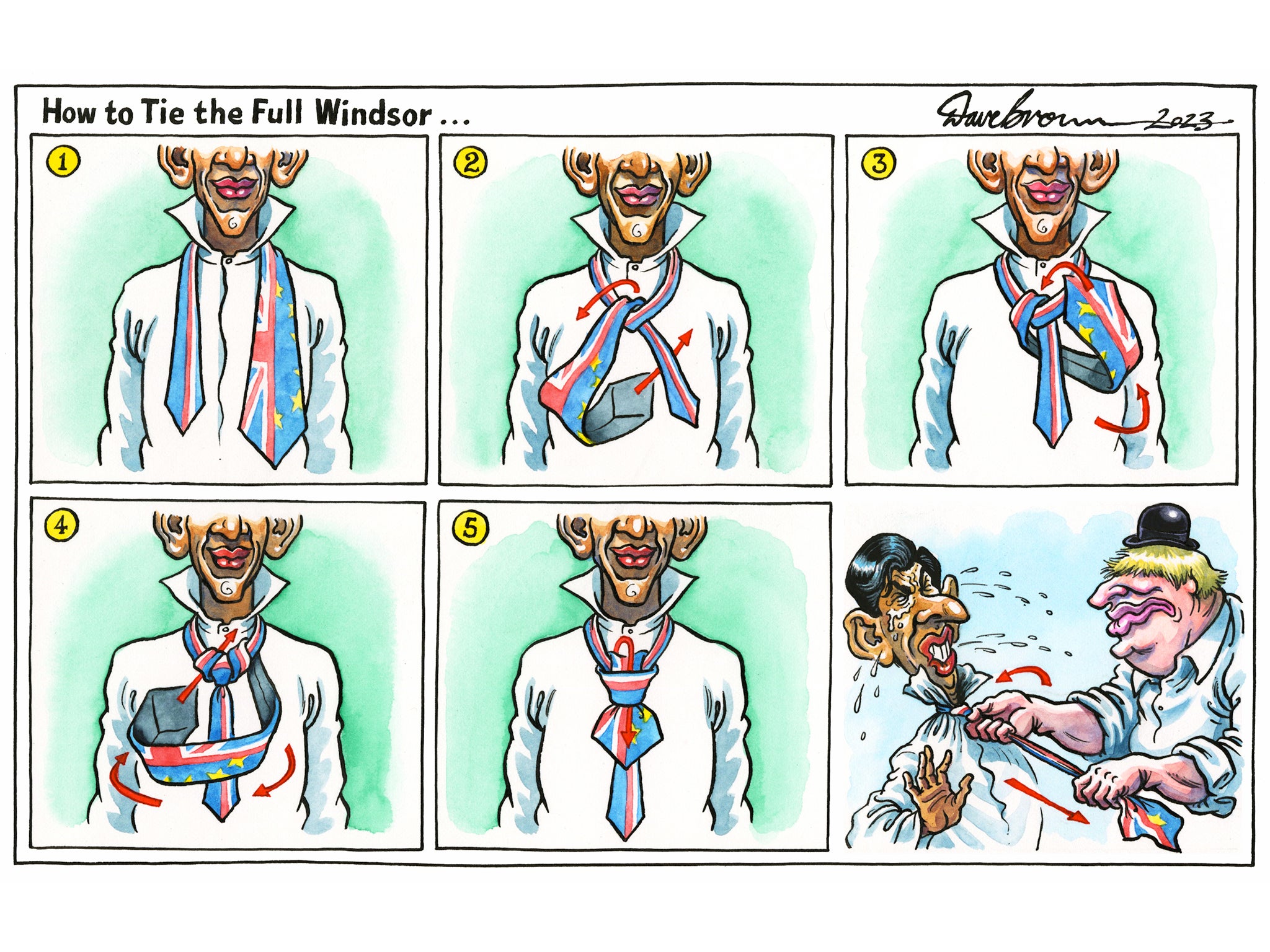For all the encomia heaped on this Conservative prime minister, an unfamiliar phenomenon in recent times, the Windsor Framework only represents the first of the great political prizes that Rishi Sunak may yet secure.
Having “got Brexit done”, finally, Mr Sunak is now presented with the opportunity to restore the power-sharing arrangements in Northern Ireland, and with them help to preserve peace. If Mr Sunak manages to get the Democratic Unionist Party to rejoin the executive and take their seats in the assembly, then he will deserve yet more paeans of praise from friend and foe alike. Unlikely as it may seem, this courteous technocrat, only an MP since 2015, is turning into something of a statesman.
Now, however, he needs to be a salesman. The DUP is a tough audience at the best of times, and their recent electoral setbacks, pushed into second place by Sinn Fein in the Stormont elections last year, have not left them in the best of humours. The sometimes irksome workings of the Northern Ireland protocol were a still more potent source of grievance, and many unionists felt that they were being edged out of the UK.
They felt, with some cause, that citizens in Belfast were being treated less favourably than their counterparts in Bristol or Banff. Something had to be done. So it has been. The DUP shouldn’t need to be persuaded of the obvious merits of the protocol deal, which meets most of the seven tests the DUP set for it. But the DUP have been let down by British prime ministers before, and they are understandably cautious. The party is clearly divided, with Sammy Wilson and Ian Paisley Jr, markedly less positive about the Windsor Framework than their leader, Sir Jeffrey Donaldson, and there is much talking to be done, as ever.
Fortunately, Mr Sunak has two substantial incentives to offer the DUP, political and economic. First is the so-called Stormont brake. This ensures that Northern Ireland can object to new EU single market rules and, in extremis, prevent their application to Northern Ireland, albeit via the intervention of the British government. “Ulster says no” will be a reality rather than a provocative slogan to be ignored by London, Dublin and Brussels. That veto is far more than was in the original Northern Ireland protocol, or the UK bill, now dropped, that threatened to disapply it unilaterally.
The obvious point here is that for such powers to be used by the DUP, for the benefit of the people of Northern Ireland, they are required to turn up to Stormont and start work again. It does mean that Sir Jeffrey will have to serve as deputy first minister under Sinn Fein’s Michelle O’Neill, who would be first minister. That is a break with tradition in the province, where a unionist has traditionally held such a title, but the reality is that the pair would be co-first ministers, each with a veto power, and where neither can fire the other. The reward is that DUP politicians will join the Ulster Unionists, Alliance, the SDLP and Sinn Fein in the exercise of power and the mission of improving the lives of the people.
Politically, the DUP has to watch that they aren’t outflanked by the loyalists of Traditional Ulster Voice. But the Windsor Framework means less EU in the lives of people, and the DUP should make the most of that achievement. There can be few, if any, more concessions to be realistically extracted from Brussels through threats and obduracy. The deal is done and should be seized, especially now that the Windsor Framework is certain to be implemented in any event – why not get the credit? The alternative for the DUP is a permanent boycott of Stormont, and to have the six counties run by British ministers and local civil servants indefinitely. That is not sustainable, good for peace, or electorally attractive to Northern Irish voters.
The second incentive for the DUP is economic. As Mr Sunak puts it, “only you guys” in Northern Ireland will have full access to the UK internal market and privileged access to the EU single market. That is now going to happen anyway, but the DUP in government will be able to make the very most of this status, unique across the European continent. It should mean a real boost to economic growth and prosperity. The early signs of superior growth in the province under the protocol suggest that this will indeed be the case. A boom awaits.
As ever with Brexit, there is a trade-off between sovereignty and prosperity. The Windsor Framework has tilted that trade-off greatly to the advantage of Northern Ireland, with only a minimal loss of nominal sovereignty balanced by a huge gain in living standards and political vitality with the restoration of representative government. The DUP has everything to gain. They should say “yes”.




Join our commenting forum
Join thought-provoking conversations, follow other Independent readers and see their replies
Comments